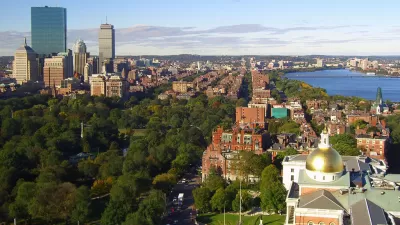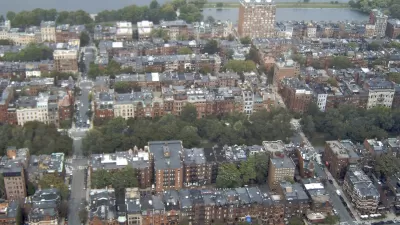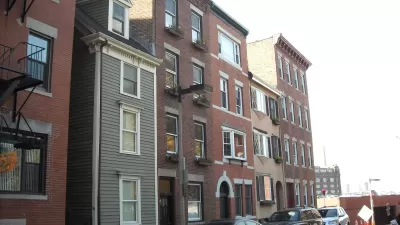The glitzy new neighborhood doesn’t cater to all Boston residents, according to a new survey.

Adrian Walker reports on Boston’s Seaport District and the findings of a survey that suggest diversity continues to be an issue for the new waterfront development area.
"A newly completed survey that asked 953 Boston residents their attitudes about the neighborhood found that, overwhelmingly, black residents feel less comfortable in the Seaport than white people do. Specifically, 24 percent of black respondents said they find the place unwelcoming, compared with a mere 6 percent of whites," says Walker.
The neighborhood is overwhelmingly white, reflecting economic factors, notes Walker. The housing is high end and expensive, developers included little affordable housing, and public transportation access is limited.
Public funds are behind Seaport, and the neighborhood should be available to all Boston residents, argues Walker. "Housing is still being built, so there’s still an opportunity to force developers to make more of it affordable. The public areas can be more clearly delineated, with activities that will attract more diverse audiences. Its transportation woes have to be addressed, and better access from Roxbury, Dorchester, and Mattapan has to be part of that conversation."
FULL STORY: Will people of color ever feel that they belong in the Seaport?

Study: Maui’s Plan to Convert Vacation Rentals to Long-Term Housing Could Cause Nearly $1 Billion Economic Loss
The plan would reduce visitor accommodation by 25,% resulting in 1,900 jobs lost.

North Texas Transit Leaders Tout Benefits of TOD for Growing Region
At a summit focused on transit-oriented development, policymakers discussed how North Texas’ expanded light rail system can serve as a tool for economic growth.

Using Old Oil and Gas Wells for Green Energy Storage
Penn State researchers have found that repurposing abandoned oil and gas wells for geothermal-assisted compressed-air energy storage can boost efficiency, reduce environmental risks, and support clean energy and job transitions.

Private Donations Propel Early Restoration of Palisades Playground
Los Angeles has secured over $1.3 million in private funding to restore the Pacific Palisades playground months ahead of schedule, creating a modern, accessible space that supports community healing after recent wildfires.

From Blight to Benefit: Early Results From California’s Equitable Cleanup Program
The Equitable Community Revitalization Grant (ECRG) program is reshaping brownfield redevelopment by prioritizing projects in low-income and environmental justice communities, emphasizing equity, transparency, and community benefits.

Planting Relief: Tackling Las Vegas Heat One Tree at a Time
Nevada Plants, a Las Vegas-based nonprofit, is combating the city’s extreme urban heat by giving away trees to residents in underserved neighborhoods, promoting shade, sustainability, and community health.
Urban Design for Planners 1: Software Tools
This six-course series explores essential urban design concepts using open source software and equips planners with the tools they need to participate fully in the urban design process.
Planning for Universal Design
Learn the tools for implementing Universal Design in planning regulations.
Ascent Environmental
Borough of Carlisle
Institute for Housing and Urban Development Studies (IHS)
City of Grandview
Harvard GSD Executive Education
Toledo-Lucas County Plan Commissions
Salt Lake City
NYU Wagner Graduate School of Public Service





























